七年级第四单元知识点英语
人教版七年级下册英语unit4知识点+经典练习题

人教版七年级下册英语unit4知识点+经典练习题人教版七年级下册英语unit4 知识点+经典练习题Unit4.Don’t run in the hall way!One:重点词组1.class rules班规;school rules校规;a lot of/lots of rules许多规则;make rules制定规则;follow the rules遵守规则;wear schol uniforms穿校服;wear a hat戴帽子;listen to(the music\the tape)听音乐/听磁带;watch the video/DVD/VCD.观看---;eat in the dinning hall在餐厅吃饭;fight with others与别人打架;run in the hall way在大厅过道跑步;2.arrive late for class上课迟到;be late for class上课迟到;be late for school上学迟到;be quiet安静的;be noisy吵闹的;make the /your bed整理床铺;talk aloud/loudly大声交谈;make much noise大声喧哗;relax yourself放松你自己;3. Too many/too much太多;on school nights在学校的晚上;make dinner做饭;on time准时;Have to---必须,不得不;Two:重点句型1. don’t +v! 请不要---(否定祈使句)(1)Please don’t run in the hall way!请别在大厅过道跑步!(2)Don’t fight with others,please.请不要和别人打架!(3)Don’t make much noise吵杂声at the library!别在图书馆发出吵闹声!(4)Don’t talk aloud/loudly in class!请别在课堂上大声交谈!(5)Don’t listen to music in class!请别在课堂上听音乐!(6)Don’t eat in the classroom,plea se!请别在教室吃东西!(7)Please don’t arrive late for class\school!上学/课请不要迟到!Please don’t be l ate for class/school.(8)Tom,please don’t read in bed!(9)Don’t be noisy!请不要吵闹!(10)Please be quiet!请保持安静!2.-What are the rules?/-We must be on time for class.3.-What are the school rules?有哪些校规啊?-What are the class rules?有哪些班规啊?4.What do you have to do?你一定得做什么啊?5.-Can we (eat in the clsssroom/wear a hat in class)?我们必须---吗?6.-Do you have to get to school before 8am?-Does she have to wear a uniform at school?7(1)There are lots of things to do.There are lots of things you can do.你有许多事情可以做(2)They make rules to help us,we have to follow these rules.(3)You should listen to music to relax yourself.你应当听音乐来放松一下你自己。
七年级上册英语第四单元知识点归纳
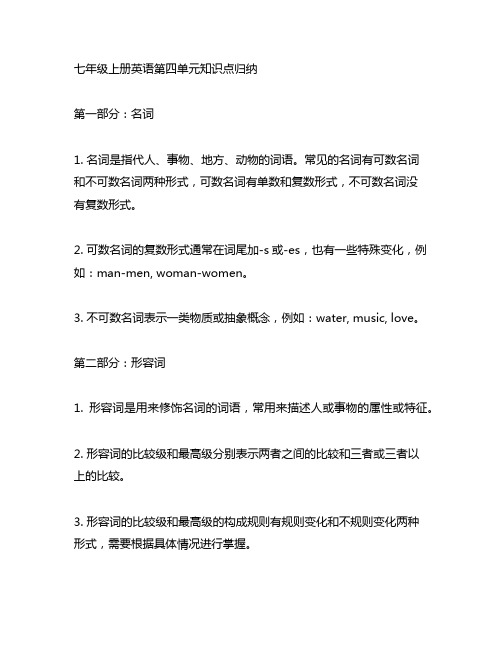
七年级上册英语第四单元知识点归纳第一部分:名词1. 名词是指代人、事物、地方、动物的词语。
常见的名词有可数名词和不可数名词两种形式,可数名词有单数和复数形式,不可数名词没有复数形式。
2. 可数名词的复数形式通常在词尾加-s或-es,也有一些特殊变化,例如:man-men, woman-women。
3. 不可数名词表示一类物质或抽象概念,例如:water, music, love。
第二部分:形容词1. 形容词是用来修饰名词的词语,常用来描述人或事物的属性或特征。
2. 形容词的比较级和最高级分别表示两者之间的比较和三者或三者以上的比较。
3. 形容词的比较级和最高级的构成规则有规则变化和不规则变化两种形式,需要根据具体情况进行掌握。
第三部分:动词1. 动词是表示动作或状态的词语,包括行为动词和系动词两种形式。
2. 行为动词表示具体的动作或行为,例如:run, jump, study。
3. 系动词用来连接主语和表语,表示状态或性质,例如:be, seem, be。
第四部分:句型1. 英语句子的基本结构通常是主语+谓语+宾语的形式,也可以根据需要添加状语等修饰成分。
2. 英语句型可以按照功能和结构进行分类,例如陈述句、疑问句、祈使句等。
3. 在表达句子时需要注意时态、语态和语气等方面的要求,以确保表达准确。
总结回顾通过对七年级上册英语第四单元的知识点进行全面梳理和归纳,我们对名词、形容词、动词和句型等方面都有了更深入的理解。
名词的单数复数形式、形容词的比较级最高级、动词的行为和状态等都是我们学习和掌握的重点内容。
在学习过程中,我们需要多加练习,加深对这些知识点的理解和运用,从而提高英语表达能力。
个人观点和理解对于七年级上册英语第四单元的知识点,我个人觉得形容词的比较级和最高级是比较有意思的部分。
在比较两者或多者之间的差异时,可以使用这些形容词来进行描述,更加生动有趣。
名词的单数复数形式也是需要细心对待的地方,一些不规则的变化需要多加记忆和练习。
人教版英语七年级上册第四单元
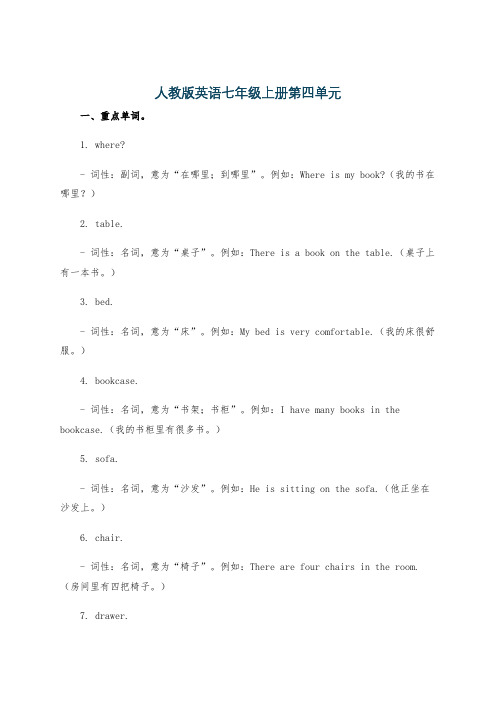
人教版英语七年级上册第四单元一、重点单词。
1. where?- 词性:副词,意为“在哪里;到哪里”。
例如:Where is my book?(我的书在哪里?)2. table.- 词性:名词,意为“桌子”。
例如:There is a book on the table.(桌子上有一本书。
)3. bed.- 词性:名词,意为“床”。
例如:My bed is very comfortable.(我的床很舒服。
)4. bookcase.- 词性:名词,意为“书架;书柜”。
例如:I have many books in the bookcase.(我的书柜里有很多书。
)5. sofa.- 词性:名词,意为“沙发”。
例如:He is sitting on the sofa.(他正坐在沙发上。
)6. chair.- 词性:名词,意为“椅子”。
例如:There are four chairs in the room.(房间里有四把椅子。
)7. drawer.- 词性:名词,意为“抽屉”。
例如:There are some pens in the drawer.(抽屉里有一些钢笔。
)8. plant.- 词性:名词,意为“植物”;也可作动词,意为“种植”。
例如:The plant is very beautiful.(这株植物很漂亮。
)I plant some flowers in my garden.(我在我的花园里种了一些花。
)二、重点短语。
1. under the table.- 意为“在桌子下”。
例如:The cat is under the table.(猫在桌子下面。
)2. on the sofa.- 意为“在沙发上”。
例如:My bag is on the sofa.(我的包在沙发上。
)3. in the bookcase.- 意为“在书柜里”。
例如:All my books are in the bookcase.(我所有的书都在书柜里。
七年级上册第四单元英语知识点汇总
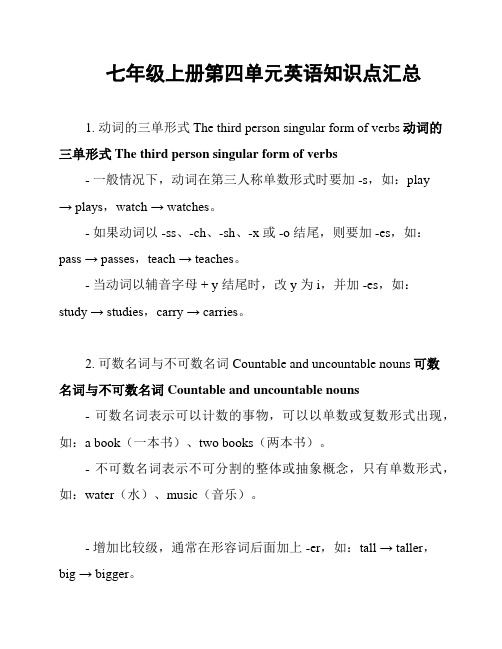
七年级上册第四单元英语知识点汇总1. 动词的三单形式 The third person singular form of verbs动词的三单形式 The third person singular form of verbs- 一般情况下,动词在第三人称单数形式时要加 -s,如:play→ plays,watch → watches。
- 如果动词以 -ss、-ch、-sh、-x 或 -o 结尾,则要加 -es,如:pass → passes,teach → teaches。
- 当动词以辅音字母 + y 结尾时,改 y 为 i,并加 -es,如:study → studies,carry → carries。
2. 可数名词与不可数名词 Countable and uncountable nouns可数名词与不可数名词 Countable and uncountable nouns- 可数名词表示可以计数的事物,可以以单数或复数形式出现,如:a book(一本书)、two books(两本书)。
- 不可数名词表示不可分割的整体或抽象概念,只有单数形式,如:water(水)、music(音乐)。
- 增加比较级,通常在形容词后面加上 -er,如:tall → taller,big → bigger。
- 增加最高级,通常在形容词前加上 the,并在形容词后加上 -est,如:tall → the tallest,big → the biggest。
4. 频率副词 Adverbs of frequency频率副词 Adverbs of frequency- 频率副词用来表示动作发生的频率,如:always(总是)、sometimes(有时候)、never(从不)。
5. 情态动词 Modal verbs情态动词 Modal verbs- 情态动词用来表示说话人的态度、愿望、能力等,如:can (能)、could(可以)、may(可能)。
七年级英语上册unit4知识点
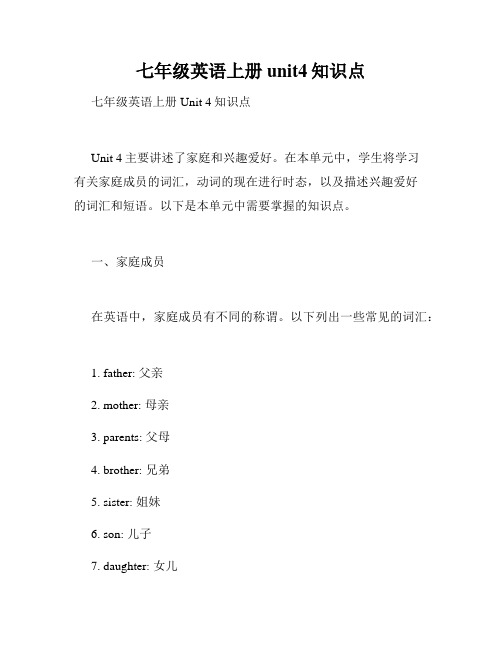
七年级英语上册unit4知识点七年级英语上册Unit 4知识点Unit 4主要讲述了家庭和兴趣爱好。
在本单元中,学生将学习有关家庭成员的词汇,动词的现在进行时态,以及描述兴趣爱好的词汇和短语。
以下是本单元中需要掌握的知识点。
一、家庭成员在英语中,家庭成员有不同的称谓。
以下列出一些常见的词汇:1. father: 父亲2. mother: 母亲3. parents: 父母4. brother: 兄弟5. sister: 姐妹6. son: 儿子7. daughter: 女儿8. grandfather: 爷爷9. grandmother: 奶奶10. grandson: 孙子11. granddaughter: 孙女12. uncle: 叔叔 / 姑父 / 舅舅 / 伯伯13. aunt: 阿姨 / 姑妈 / 舅妈 / 婶婶14. cousin: 堂/表兄弟姐妹在描述家庭关系时,可以使用“my”,“your”等形容词性物主代词。
例如:“my father is a doctor”(我的父亲是一位医生)。
二、现在进行时态现在进行时态表示现在正在进行中的动作。
我们使用“be”动词的现在式,加上动词的现在分词形式。
1. be动词的现在形式(am / is / are):am: 我is: 他/她/它/单数主语are:他们/她们/它们/复数主语2. 动词的现在分词形式(-ing):例如,“He is reading a book”表示他正在阅读一本书。
以下是一些常见的现在进行时态使用的动词和短语:1. play: 玩2. do: 做3. watch: 观看4. read: 阅读5. listen: 听6. swim: 游泳7. dance: 跳舞8. sing: 唱歌9. draw: 画图10. cook: 烹饪三、兴趣爱好以下列出一些常见的兴趣爱好相关的词汇和短语:1. swim: 游泳2. dance: 跳舞3. sing: 唱歌4. play football: 踢足球5. play basketball: 打篮球6. play chess: 下棋7. listen to music: 听音乐8. watch TV: 看电视9. read books: 读书10. take photos: 拍照片需要注意的是,动词后面有时会跟上to + 动词原形,表示不同的意思。
初一四单元知识点总结

初一四单元知识点总结本单元的重点知识包括问路和指路、购物和交易以及日常生活常用语等方面的内容。
下面将对这些知识点进行总结。
问路和指路1. 问路的常用句型在问路时,我们可以使用一些固定的句型来询问路线,比如:- Excuse me, could you tell me how to get to the nearest bank?- Can you show me the way to the train station?- Where is the nearest bus stop, please?2. 指路的表达方式在指路时,我们可以使用一些词语和表达方式来告诉对方应该如何到达目的地,比如: - Go straight and turn left at the first crossing.- It's just round the corner on the right.- You can take the subway to get there.购物和交易1. 购物时的用语在购物时,我们需要学会使用一些有关购物的常用用语,比如:- How much is this shirt?- Do you have this in a larger size?- I'd like to return this pair of shoes.2. 交易中常用的表达方式在进行交易时,需要使用一些常用的表达方式来和商家进行沟通,比如:- Can I pay by credit card?- Could you give me a discount?- I'd like to exchange this for another one.日常生活常用语1. 日常用语的表达方式在日常生活中,我们需要使用一些常用的句型和表达方式来和他人进行交流,比如: - How are you doing?- What's the weather like today?- Have a nice day!2. 时间和日期的表达方式在描述时间和日期时,我们可以使用一些固定的表达方式来表达时间和日期,比如: - It's half past ten.- Today is Monday, the 5th of June.- What time is it now?以上就是初一英语第四单元知识点的总结,希望对大家的学习有所帮助。
七年级上册英语unit4知识点

七年级上册英语unit4知识点七年级上册英语Unit4 知识点Unit4主要涉及描述人物外貌、性格和兴趣爱好等常用英语表达。
本文将介绍Unit4的知识点,以帮助读者巩固英语语法和词汇。
一、基本句型1.主语+be动词+形容词例如:Tom is tall and thin.Lily is beautiful and kind.2.主语+be动词+不定式例如:My dream is to be a doctor.His goal is to travel around the world.3.主语+be动词+名词例如:She is a teacher.He is a musician.4.主语+动词+副词例如:The dog runs quickly.She speaks English fluently.5.主语+动词+宾语例如:He likes playing basketball. They enjoy watching movies.6.主语+动词+间接宾语+直接宾语例如:She gave him a book.They showed us how to cook.7.主语+情态动词+动词原形例如:I can swim.He should study harder.二、形容词形容词用于描述人的外貌和性格,下面列出一些常用的形容词:外貌高:tall矮:short胖:fat瘦:thin漂亮:beautiful帅气:handsome性格友好:friendly腼腆:shy聪明:smart勇敢:brave慷慨:generous害羞:timid三、不定式不定式用于表示目的或意图,下面列举一些常用的不定式:to be:成为to do:做to have:拥有to go:去to learn:学习to play:玩to read:读to see:看to sing:唱歌四、人物的兴趣爱好人物的兴趣爱好也是本单元的重点,下面是一些有用但简单的短语:play sports:运动listen to music:听音乐play musical instruments:演奏乐器read books:阅读watch TV:看电视draw pictures:画画write stories:写作五、总结总之,Unit4主要强调描述人物的外貌、性格和兴趣爱好等方面。
人教版七年级英语上册unit 4 句子讲解及知识点梳理
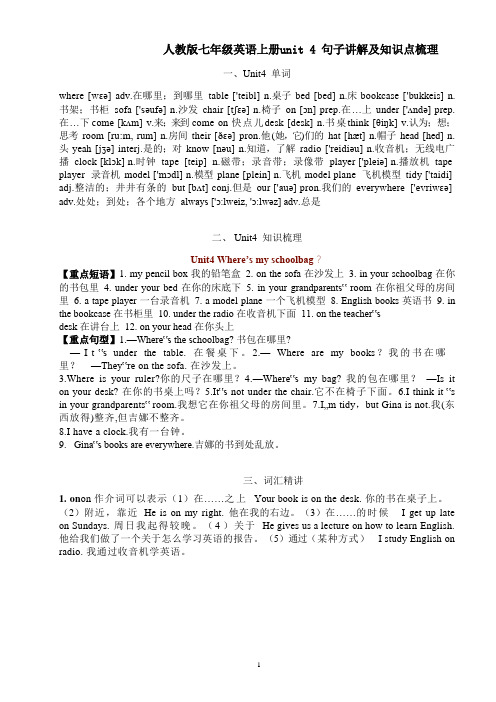
人教版七年级英语上册unit 4 句子讲解及知识点梳理一、Unit4 单词where [wɛə] adv.在哪里;到哪里table ['teibl] n.桌子bed [bed] n.床bookcase ['bukkeis] n. 书架;书柜sofa ['səufə] n.沙发chair [tʃɛə] n.椅子on [ɔn] prep.在…上under ['ʌndə] prep. 在…下come [kʌm] v.来;来到come on 快点儿desk [desk] n.书桌think [θiŋk] v.认为;想;思考room [ru:m, rum] n.房间their [ðɛə] pron.他(她,它)们的hat [hæt] n.帽子head [hed] n. 头yeah [jʒə] interj.是的;对know [nəu] n.知道,了解radio ['reidiəu] n.收音机;无线电广播clock [klɔk] n.时钟tape [teip] n.磁带;录音带;录像带player ['pleiə] n.播放机tape player 录音机model ['mɔdl] n.模型plane [plein] n.飞机model plane 飞机模型tidy ['taidi] adj.整洁的;井井有条的but [bʌt] conj.但是our ['auə] pron.我们的everywhere ['evriwɛə] adv.处处;到处;各个地方always ['ɔ:lweiz, 'ɔ:lwəz] adv.总是二、 Unit4 知识梳理Unit4 Where’s my schoolbag?【重点短语】1. my pencil box 我的铅笔盒 2. on the sofa 在沙发上 3. in your schoolbag 在你的书包里4. under your bed 在你的床底下 5. in your grandparents‟ room 在你祖父母的房间里 6. a tape player 一台录音机7. a model plane 一个飞机模型8. English books 英语书9. in the bookcase 在书柜里10. under the radio 在收音机下面11. on the teacher‟sdesk 在讲台上12. on your head 在你头上【重点句型】1.—Where‟s the schoolbag? 书包在哪里?—I t ‟s under the table. 在餐桌下。
七年级上册英语unit 4知识点

七年级上册英语unit 4知识点Unit 4是七年级上册英语的一个重要单元,主要围绕“Where's my backpack? ”这个话题展开,涉及到词汇、语法和口语表达等方面的知识点。
下面是本文对Unit 4的详细介绍。
一、词汇1. 名词:backpack(背包)、book(书)、pencil(铅笔)、pen(钢笔)、eraser(橡皮擦)、ruler(尺子)等;2. 形容词:old(旧的)、new(新的)、big(大的)、small (小的)等;3. 动词:have(拥有)、need(需要)、find(找到)、look for(寻找)、take(拿)、put(放)、give(给)等;4. 介词:in(在……之中)、on(在……上面)、under (在……下面)、behind(在……后面)、beside(在……旁边)等。
二、语法1. 一般现在时:主语+动词原形+其他。
例如:(1) I have a backpack.(2) She needs a book.(3) They look for the pencil.(4) He takes the eraser.2. 疑问句和肯定句的变换:将疑问句改为肯定句时,用Yes或No进行回答,动词要用助动词do或does。
例如:(1) Is your backpack new? → Yes, it is. 或 No, it isn't.(2) Do you have a pencil? → Yes, I do. 或 No, I don't.(3) Does she need a ruler? → Yes, she does. 或 No, she doesn't.3. 指示代词This和That的使用:This用于指离说话者近的人、物,That用于指离说话者远的人、物。
例如:(1) This is my backpack.(2) That is your book.(3) These pencils are new.(4) Those erasers are old.三、口语表达1. 问路:Excuse me, where is the library/cafeteria/bathroom?(打扰一下,请问图书馆/餐厅/洗手间在哪里?)2. 回答方向:Go straight/turn left/turn right/ go up the stairs/ go down the stairs/ it's on the second floor.(直走/向左拐/向右拐/往楼上走/往楼下走/它在二楼。
七年级英语上册第四单元知识点
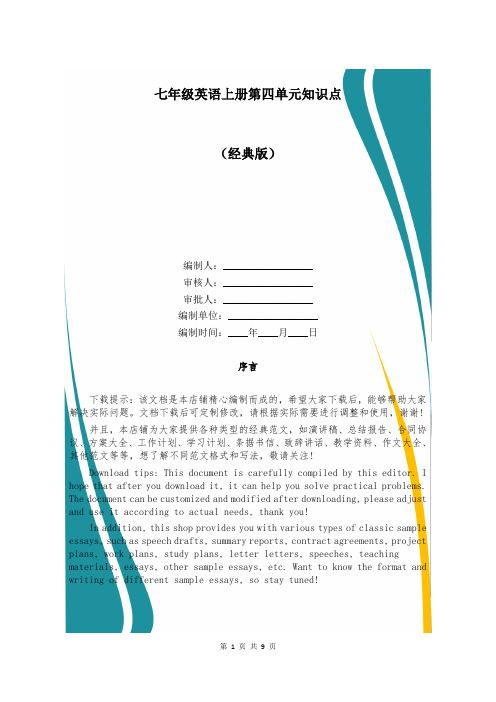
七年级英语上册第四单元知识点(经典版)编制人:__________________审核人:__________________审批人:__________________编制单位:__________________编制时间:____年____月____日序言下载提示:该文档是本店铺精心编制而成的,希望大家下载后,能够帮助大家解决实际问题。
文档下载后可定制修改,请根据实际需要进行调整和使用,谢谢!并且,本店铺为大家提供各种类型的经典范文,如演讲稿、总结报告、合同协议、方案大全、工作计划、学习计划、条据书信、致辞讲话、教学资料、作文大全、其他范文等等,想了解不同范文格式和写法,敬请关注!Download tips: This document is carefully compiled by this editor. I hope that after you download it, it can help you solve practical problems. The document can be customized and modified after downloading, please adjust and use it according to actual needs, thank you!In addition, this shop provides you with various types of classic sample essays, such as speech drafts, summary reports, contract agreements, project plans, work plans, study plans, letter letters, speeches, teaching materials, essays, other sample essays, etc. Want to know the format and writing of different sample essays, so stay tuned!七年级英语上册第四单元知识点学习知识容易,转化成为能力很难;提出问题容易,得到圆满答复很难;点评别人容易,身临其境去做很难;指责同事容易,正确评价自己很难。
人教版七年级英语第四单元知识点
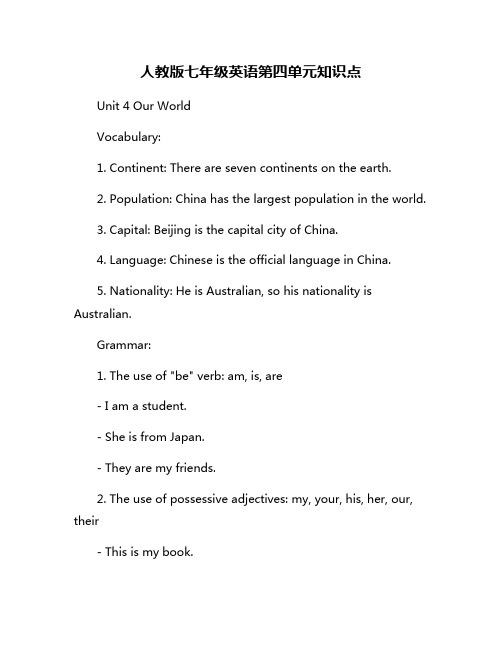
人教版七年级英语第四单元知识点Unit 4 Our WorldVocabulary:1. Continent: There are seven continents on the earth.2. Population: China has the largest population in the world.3. Capital: Beijing is the capital city of China.4. Language: Chinese is the official language in China.5. Nationality: He is Australian, so his nationality is Australian.Grammar:1. The use of "be" verb: am, is, are- I am a student.- She is from Japan.- They are my friends.2. The use of possessive adjectives: my, your, his, her, our, their- This is my book.- Is this your pencil?- His name is Tom.3. The use of prepositions of place: in, on, at- The cat is in the box.- The book is on the table.- The children are at the park.Sentences structure:1. Subject-Verb-Object: He plays basketball.2. Subject-Verb-Adverb: She sings beautifully.3. Subject-Verb-Object-Place: They watch TV at home.4. Subject-Verb-Object-Time: I do my homework every day.Speaking:1. Introducing oneself: My name is Mary. I am from China.2. Describing people: He is tall and handsome.3. Talking about countries and nationalities: Brazil is in South America. People from Brazil are Brazilian.4. Expressing likes and dislikes: I like swimming. I don't like running.Listening:1. Understanding basic information about countries, cities, and languages.2. Following directions and locations.3. Identifying likes and dislikes of others.Reading:1. Reading short passages about different countries and their capitals.2. Understanding information about population and languages in various countries.Writing:1. Writing a paragraph about one's favorite country.2. Describing one's family members using possessive adjectives.3. Writing a short dialogue about likes and dislikes.Overall, Unit 4 in the 7th-grade English curriculum focuses on introducing basic vocabulary, grammar, sentence structure, speaking skills, listening comprehension, reading comprehension, and writing skills related to countries,nationalities, languages, and preferences. This unit is designed to enhance students' understanding of the world around them and improve their English language proficiency.。
2024年人教版七年级上册英语情境式单元知识点背记——UNIT 4
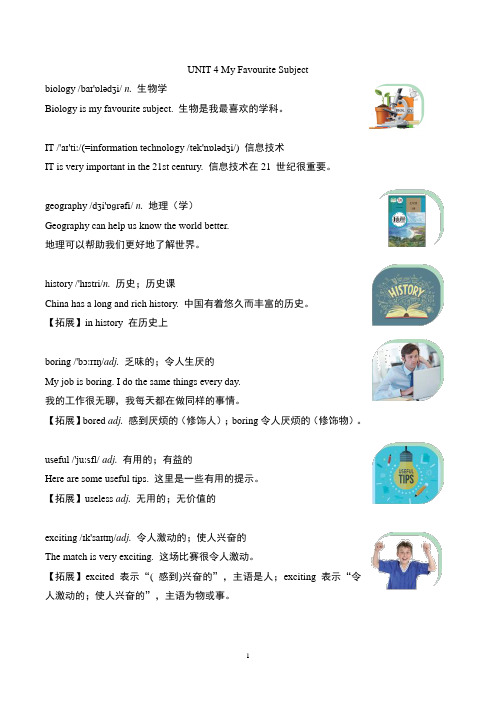
UNIT 4 My Favourite Subjectbiology /baɪ'ɒlədʒi/ n.生物学Biology is my favourite subject. 生物是我最喜欢的学科。
IT /'aɪ'tiː/(=information technology /tek'nɒlədʒi/) 信息技术IT is very important in the 21st century. 信息技术在21 世纪很重要。
geography /dʒi'ɒɡrəfi/ n.地理(学)Geography can help us know the world better.地理可以帮助我们更好地了解世界。
history /'hɪstri/n.历史;历史课China has a long and rich history. 中国有着悠久而丰富的历史。
【拓展】in history 在历史上boring /'bɔːrɪŋ/adj.乏味的;令人生厌的My job is boring. I do the same things every day.我的工作很无聊,我每天都在做同样的事情。
【拓展】bored adj.感到厌烦的(修饰人);boring令人厌烦的(修饰物)。
useful /'juːsfl/adj.有用的;有益的Here are some useful tips. 这里是一些有用的提示。
【拓展】useless adj.无用的;无价值的exciting /ɪk'saɪtɪŋ/adj.令人激动的;使人兴奋的The match is very exciting. 这场比赛很令人激动。
【拓展】excited 表示“( 感到)兴奋的”,主语是人;exciting 表示“令人激动的;使人兴奋的”,主语为物或事。
past /pɑːst/n.过去;过去的事情adj.过去的prep.在……之后It’s interesting to learn about the past. 了解过去是很有趣的。
仁爱版七年级英语上册unit4知识点
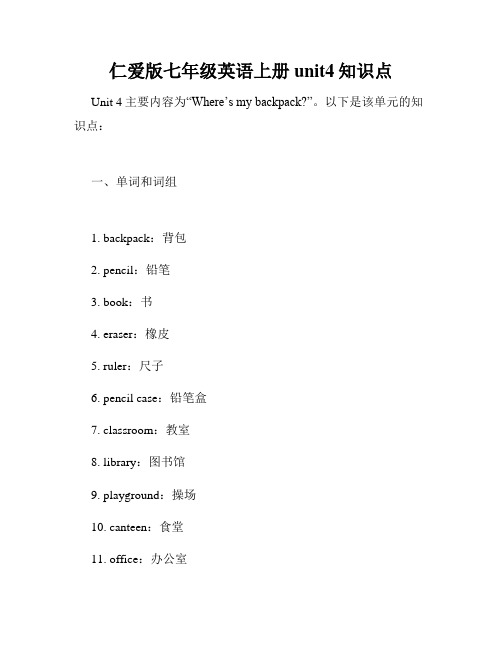
仁爱版七年级英语上册unit4知识点Unit 4主要内容为“Where’s my backpack?”。
以下是该单元的知识点:一、单词和词组1. backpack:背包2. pencil:铅笔3. book:书4. eraser:橡皮5. ruler:尺子6. pencil case:铅笔盒7. classroom:教室8. library:图书馆9. playground:操场10. canteen:食堂11. office:办公室12. restroom:卫生间13. go straight:直走14. turn left/right:向左/右拐15. on the left/right:在左/右边二、句型和语法1. Where’s my backpack?:我的背包在哪里?2. It’s in the classroom.:它在教室里。
3. Where’s my pencil case?:我的铅笔盒在哪里?4. It’s on the desk.:它在桌子上。
5. Where’s the restroom?:卫生间在哪里?6. It’s next to the library.:它在图书馆旁边。
7. Excuse me, where’s the canteen?:请问,食堂在哪里?8. Go straight and turn left.:直走然后向左拐。
9. Where’s the office?:办公室在哪里?10. It’s across from the restroom.:它在卫生间对面。
三、重点词汇解析1. classroom:教室- class:课程,班级- room:房间2. library:图书馆- libr:图书- -ary:表“地方”的后缀3. playground:操场- play:玩,游戏- ground:地面,场地4. canteen:食堂- can:罐头- teen:叫号后缀四、话题练习根据上述知识点,练习以下话题:A. 对话练习1. A: Excuse me, where’s the restroom? B: It’s next to the library.2. A: Where’s my backpack?B: It’s in the classroom.3. A: Where’s the office?B: It’s across from the restroom.4. A: Excuse me, where’s the canteen? B: Go straight and turn left.B. 句型转换1. I am next to the library.: Where am I?2. It’s in the pencil case.: Where’s the eraser?3. He’s in the classroom.: Where’s she?4. They’re on the playground.: Where are we?5. Go straight and turn right.: How can I get to the office?C. 阅读练习My ClassroomHi, my name is Lily. This is my classroom. The backpack is on the desk. The pencil case is under the chair. The book is on the shelf. The eraser is in the pencil case. The ruler is on the desk. I love my classroom.1. Who is talking about the classroom?2. Where is the backpack?3. Where’s the pencil case?4. Where’s the book?5. Is the eraser on the desk?总结:仁爱版七年级英语上册unit4知识点主要涉及单词和词组、句型和语法、重点词汇解析等方面。
2023年人教版七年级上册英语第四单元单词及学问点
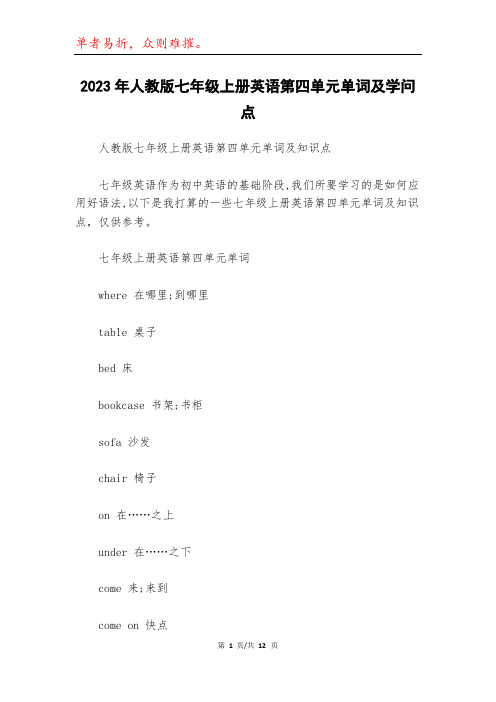
2023年人教版七年级上册英语第四单元单词及学问点人教版七年级上册英语第四单元单词及知识点七年级英语作为初中英语的基础阶段,我们所要学习的是如何应用好语法,以下是我打算的一些七年级上册英语第四单元单词及知识点,仅供参考。
七年级上册英语第四单元单词where 在哪里;到哪里table 桌子bed 床bookcase 书架;书柜sofa 沙发chair 椅子on 在……之上under 在……之下come 来;来到come on 快点desk 书桌think 认为;想;思量room 房间their 他(她;它)们hat 帽子head 头yeah 是的;对know 知道;了解radio 收音机;无线电广播 clock 时钟tape 磁带;录音带;录像带 player 播放机tape player 录音机model 模型plane 飞机model plane 飞机模型tidy 整洁的;井井有条的but 但是our 我们的everywhere 到处;处处;各个地方always 总是七年级上册英语第四单元知识点一、重点单词1. everywhere adv. 到处;处处;各个地方 tidy adj. 整洁的;井井有条的二、重点短语1. underthetable在桌子底下2. inbed在床上(卧病在床)3. inthebed在床上(躺在床上)4. onthebed在床上(不一定躺着)5. modelplane飞机模型6. comeon 快点;加油7. comeupwith想出(主意、主意)8. comeout出版;结果是9. cometrue实现10. thinkof认为;想念11. thinkabout思量;考虑(可互换)12. tapeplayer录音机13. inhisschoolbag在他书包里14. underthebed在床下15. onthechair在椅子上16. undertheradio在收音机下面17. inthebookcase在书柜里18. inyourgrandparents’room在你爷爷奶奶的房间里三、重点句型:1. —Wherearemybooks?我的书在哪儿?—They’reonthesofa. 它们在沙发上。
七年级下册英语书U4知识点
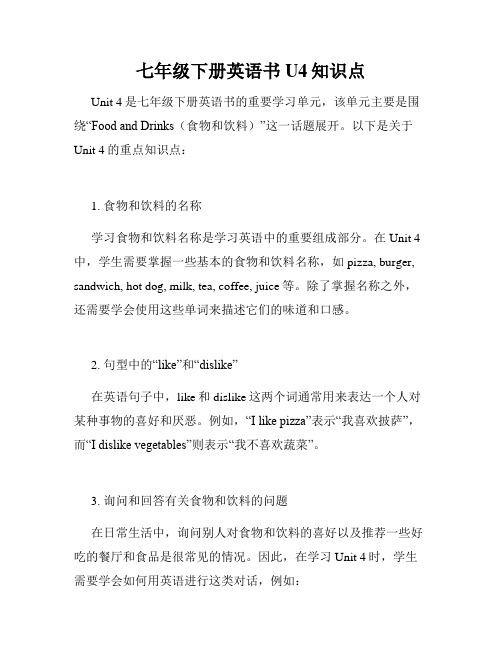
七年级下册英语书U4知识点Unit 4是七年级下册英语书的重要学习单元,该单元主要是围绕“Food and Drinks(食物和饮料)”这一话题展开。
以下是关于Unit 4的重点知识点:1. 食物和饮料的名称学习食物和饮料名称是学习英语中的重要组成部分。
在Unit 4中,学生需要掌握一些基本的食物和饮料名称,如pizza, burger, sandwich, hot dog, milk, tea, coffee, juice等。
除了掌握名称之外,还需要学会使用这些单词来描述它们的味道和口感。
2. 句型中的“like”和“dislike”在英语句子中,like和dislike这两个词通常用来表达一个人对某种事物的喜好和厌恶。
例如,“I like pizza”表示“我喜欢披萨”,而“I dislike vegetables”则表示“我不喜欢蔬菜”。
3. 询问和回答有关食物和饮料的问题在日常生活中,询问别人对食物和饮料的喜好以及推荐一些好吃的餐厅和食品是很常见的情况。
因此,在学习Unit 4时,学生需要学会如何用英语进行这类对话,例如:A: What food do you like?B: I like pizza and burgers.A: Do you like Chinese food?B: Yes, I like Chinese food. I think it's very delicious.4. 数量词及形容词的使用在描述食物和饮料时,我们需要用到数量词和形容词。
例如,“I want two hamburgers and three cups of coffee”可以描述一个人点餐的数量,而“the pizza tastes delicious”则用形容词描述了披萨的味道。
通过对上述知识点的学习,学生可以更加熟练地表达自己在日常生活中与食物和饮料相关的事情。
同时,这些知识点还能帮助学生更好地理解英语句子的构成与用法,为后续学习打下更加坚实的基础。
七年级上册英语第四单元知识点
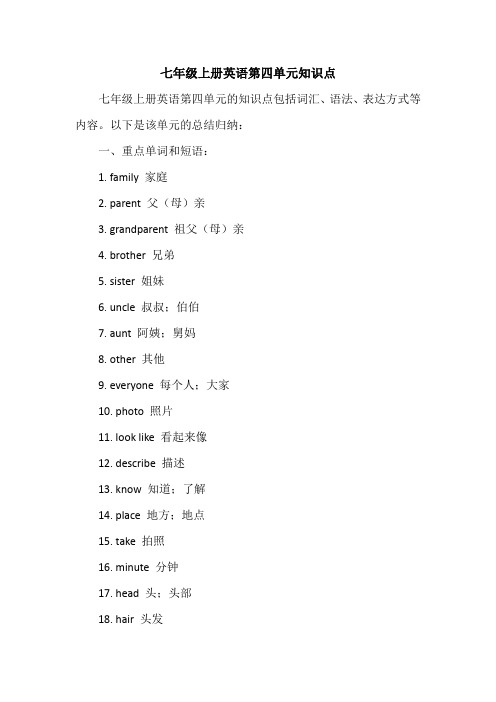
七年级上册英语第四单元知识点七年级上册英语第四单元的知识点包括词汇、语法、表达方式等内容。
以下是该单元的总结归纳:一、重点单词和短语:1. family 家庭2. parent 父(母)亲3. grandparent 祖父(母)亲4. brother 兄弟5. sister 姐妹6. uncle 叔叔;伯伯7. aunt 阿姨;舅妈8. other 其他9. everyone 每个人;大家10. photo 照片11. look like 看起来像12. describe 描述13. know 知道;了解14. place 地方;地点15. take 拍照16. minute 分钟17. head 头;头部18. hair 头发19. face 脸;面部20. nose 鼻子21. mouth 嘴;口部22. eye 眼睛23. ear 耳朵24. arm 胳膊;手臂25. hand 手26. leg 腿;腿部27. foot 脚;足部28. toe 脚趾29. dress 连衣裙;女装30. blouse 女衬衫31. skirt 裙子;短裙32. sock 短袜;袜子33. boot 长筒靴;皮靴34. buy 购买;购买(动词)35. expensive 昂贵的;高价的(形容词)36. cheap 便宜的;廉价的(形容词)37. size 号;尺寸(名词)38. color 颜色(名词)39. black 黑色(形容词及名词)40. white 白色(形容词及名词)41. red 红色(形容词及名词)42. green 绿色(形容词及名词)43. blue 蓝色(形容词及名词)44. yellow 黄色(形容词及名词)45. put on 穿上(动词短语)46. take off 脱下(动词短语)47. have on穿着(动词短语)有些英语老师会教have on = be wearing,但是实际上二者还是有区别:have on是动词短语,可以用于祈使句和一般现在时态中,而be wearing则侧重于现在进行时态,且不用于祈使句。
Unit4知识归纳人教版七年级英语下册

Unit 4短语归纳1.(be)on time 准时2.be on time for sth 准时做.... be on time for class 准时上课3. listen to...听4.in/after class在课上/下5. arrive/be late for 迟到Arrive late for class = be late for class 上课迟到6. be quiet =keep quiet 安静7. go out 外出(娱乐)8. do/wash the dishes 清洗餐具9.make breakfast 做早饭10. make one's/the bed 铺床11. be strict with sb. 对某人要求严格be strict about / in sth. 对某事要求严格12. keep one's hair short 留短发13. play with sb. 和某人一起玩14.play the piano 弹钢琴15.have fun 玩得开心16.make rules 制定规则17. follow the rules 遵守规则18. dining hall餐厅19.eat outside在外面吃20. wear the school uniform 穿校服21.in the hallways在走廊里22. good luck好运23. bring sb./sth. to+地点把某人/某物带到某地24. think about 考虑;思考用法集萃1.Don't+动词原形+其他. 不要做某事。
2. help sb. (to ) do sth. 帮助某人做某事3. too many+可数名词复数太多的too much +不可数名词太多的.much too+形容词/副词太...4. practice/practise doing sth. 练习做某事5. leave + sth.+地点状语把某物忘/留在某地动词短语:leave the dirty dishes in the kitchen 把脏碗留在厨房6. keep+宾语十形容词使.….保持某种状态7. learn to do sth. 学会做某事8. have to do sth. 不得不做某事don’t / doesn’t have to do sth 不必做某事9. remember to do sth. 记得要做某事remember doing sth. 记得做过某事10.have fun doing sth. 做某事很开心11.keep + 宾语(人称代词宾格)+ 形容词使...保持某种状态Keep them happy ! 使他们保持开心!12.It’s best to do sth. 做...是最好的。
- 1、下载文档前请自行甄别文档内容的完整性,平台不提供额外的编辑、内容补充、找答案等附加服务。
- 2、"仅部分预览"的文档,不可在线预览部分如存在完整性等问题,可反馈申请退款(可完整预览的文档不适用该条件!)。
- 3、如文档侵犯您的权益,请联系客服反馈,我们会尽快为您处理(人工客服工作时间:9:00-18:30)。
七年级第四单元知识点英语Seventh Grade Unit Four English Knowledge Points
As an essential subject for students, English plays a vital role in our daily lives. In the seventh-grade curriculum, Unit Four is a critical section where students will learn a lot of knowledge points that they need to master. This article will discuss some of the most important knowledge points that students need to understand and remember.
Basic Grammar
Verbs are the most critical part of English grammar, and students must be familiar with the various tenses used in English. The present tense is used to describe actions happening now or at a particular time. The past tense describes actions that have already happened in the past, and the future tense describes actions that are yet to occur. Regular verbs can be changed to past tense by adding "-d" or "-ed" to the end of the verb, while irregular verbs have different past tense forms.
Prepositions are also essential parts of English grammar, and they help to describe the relationship between two or more words in a
sentence. Examples of prepositions are "at," "in," "on," and "to." It is important to remember that a preposition is always used with an object.
Pronouns are used to replace nouns in a sentence. They are very useful in avoiding repetition and making a sentence more concise. Examples of pronouns are "he," "she," "it," "they," "him," "her," and "them."
Vocabulary
The English language has a vast vocabulary, and learning new words is essential for effective communication. Students should learn new words by reading books, newspapers, and online articles. Learning synonyms and antonyms can also help students expand their vocabulary, and they should practice using the new words in sentences to help them remember them.
Reading Comprehension
Reading comprehension is an essential skill in English, and students need to develop their ability to understand texts deeply. They should read widely on diverse topics and practice answering questions on the
texts. It is also essential to develop a reading strategy, such as skimming and scanning, to help them understand texts better.
Writing Skills
Writing is an essential part of English, and students should learn how to write different types of texts, such as letters, essays, and reports. They should also learn how to write using various formats, such as narrative, descriptive, and persuasive writing. Students should practice writing regularly, noting the correct use of grammar, punctuation, and spelling.
Listening and Speaking Skills
Listening and speaking are critical skills in English, and students should develop their skills in both areas. They should listen to English being spoken by native speakers and practice speaking English with others. Speaking English helps to develop confidence, fluency, and accuracy, and it enhances communication skills.
Conclusion
The knowledge points discussed in this article are essential for students to master in the seventh-grade English curriculum. English is a language that requires consistent practice and dedication to become proficient. Students need to have a good foundation in basic grammar, vocabulary, reading comprehension, writing skills, listening, and speaking. With this foundation, they will be well equipped to deal with the challenges of learning English, and they will be able to communicate effectively in the language.。
